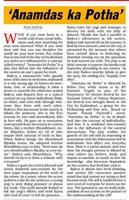Anamdas ka Potha - Review
 Source: Vijay Times, BVT LifeStyle - 4.
Source: Vijay Times, BVT LifeStyle - 4.Copyright © 2005 Puja Goyal.
What if you were born in a world void of any social influences and were searching for your own answers? What if you were then told that you can decipher the world on your own terms, but realise that at the end of the day every decision you arrive at is influenced by a concept called society? Anamdas ka Potha is a play that delves into the influences of the society on one's quest for truth.
Raikva, a tattwasarshi rishi, spends most of his time in seclusion; orphaned at a very young age, he knows no emotions, love, or relationship. It takes a storm to unsettle the otherwise settled Raikva, and deports him to a typical societal set-up where individuals think, co-relate, and exist only through relations they form with each other. Raikva's first encounter in the society is Jabala the princess; she is the first woman he sees and immediately falls in love with. He goes on to encounter more people from the society in various forms, like a mother (Ritambhara), sister (Rijukka), father, etc. all of who impart their concept of truth to him. When Raikva brings the abandoned Rijukka home, his adopted mother Ritambhara says to him, "from now on you should address Rijukka as your sister." Raikva asks Ritambhara, "Why should we have to form a relation with everyone?"
Raikva's quest for truth is blurred and slowly rendered non-existent by the slow super imposition of the truth of the others. In a scene, where the actors perform a skit for the princess; a young yogi is seen doing penance to please the God's. The God's instead intend to foil the yogi's efforts and send Kama (the God of Love) to foil his penance… Kama lures the yogi and manages to destroy his faith with the help of dancers. Maybe this had a parallel to Raikva's adventures in the society. Raikva had started off on his journey to find his own answers, and on the way, is presented by the answers that others have settled down to believing in; therefore loosing out on the questions he had started out with. Anamdas ka Potha, is an ideal concept to expose the intellectual hypocrisy prevailing in our society. In the end, Raikva marries Jabala to give the story, the ending of a "happily ever after".
Anamdas ka Potha, was directed by Robin Das, and music directed by B.V. Karanth. It was staged on the 18th of October, as part of the Natyotsava '05 theatre festival, by the National School of Drama Repertory, at Chowdiah Memorial Hall. The festival was brought down to Bangalore by Kadambari, a group for the Performing and Fine Arts in aid of its Shivarpatna Village Project. The concept of Anamdas ka Potha was unique, but there were many scenes that were unnecessary and could have easily seen the editing table. Even though the play was long, it was passable due to superb lighting, music and dialogue delivery.
Based on Hazari Prasad Dwivedi's novel, Anamdas ka Potha is an in-depth look into the concept of individuality, and how it is rendered non-existent due to the influences of the societal interactions. The play studies the growth of the self and its reasoning in association with the information fed by individuals that affect our everyday lives. Man IS a social animal, and over time, his thought process is diluted by what others say, believe, think, and impart to another, so much so that his knowledge also becomes dependent on the sources that feed him with it.
Raikva is drawn into herd thinking, and society life consumes another mind that had started out trying to find his own truth. His self is rendered into a sum total of everyone he meets on the way. The question is, are we really independent of our actions in the pursuit of the understanding of the self?
Comments